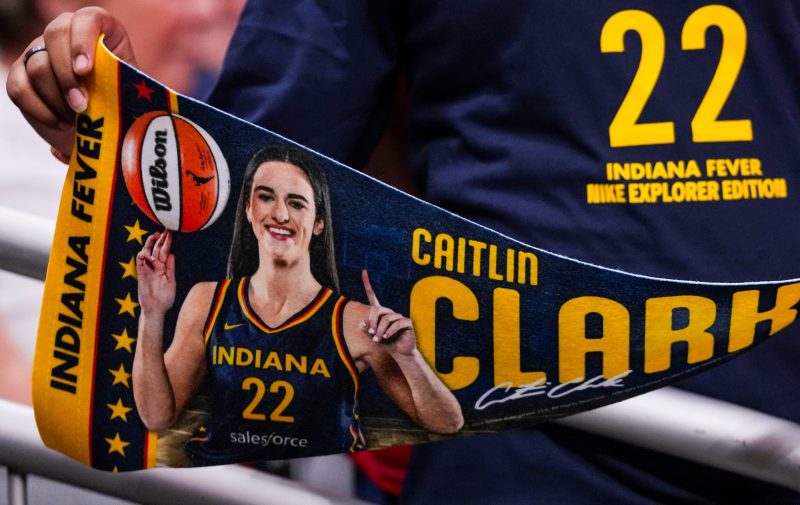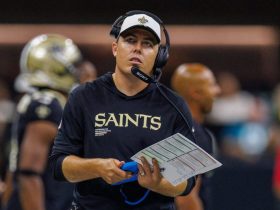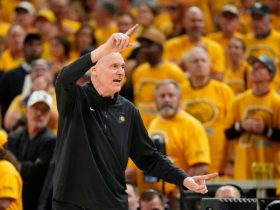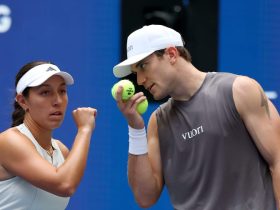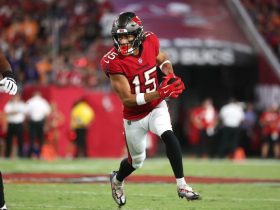Not every athlete can be LeBron James or Megan Rapinoe.
Remember Michael Jordan’s comment about Republicans buying shoes? There’s a long history of athletes putting as much space as possible between themselves and controversy, and what Caitlin Clark and Patrick Mahomes did this week was no different.
Asked about the upcoming presidential election Wednesday and who they might be supporting, both Clark and Mahomes dodged the question and instead found a safe space in encouraging people to register and to vote.
“It’s more than nothing, but it doesn’t put them on the front lines of the discussion,” said David Niven, an associate professor of political science at the University of Cincinnati who teaches a course on sports and politics.
“If you look at all this by the LeBron James standard, somebody who could not have been more outspoken … this looks like a little bit of a retreat,” Niven said. “If you look at it by Derek Jeter and Michael Jordan’s standards, you’d say there’s still an awful lot of political activism out there.”
Athlete involvement in politics is taken for granted these days. James appeared beside Hillary Clinton in 2016 and four years ago helped launch a group dedicated to safeguarding voting rights for Black Americans. Rapinoe was an early endorser of Joe Biden, even jokingly offering to be his running mate.
As a collective, the WNBA flipped the U.S. Senate in 2020. This year, the league used its Commissioner’s Cup to raise money for voting and reproductive rights.
But this widespread politicking, particularly by individual athletes, is a relatively new phenomenon.
Notable as their activism was, Muhammad Ali, James Brown and Billie Jean King were outliers. Star athletes were far more likely to follow the lead of Jordan, Jeter and Tiger Woods, who specifically avoided doing or saying anything that could alienate their fan bases or, probably more importantly, their sponsors.
“There’s absolutely a risk if you get involved,” said Niven, who researched the next contracts of NFL players who knelt in protest of police brutality against Black and brown people and found they were worth less than those of comparable players who didn’t protest.
“There’s a very real cost to speaking your mind or acting your beliefs.”
Clark’s Instagram account is now flooded with nasty comments from supposed fans who are upset she liked Taylor Swift’s post endorsing Kamala Harris. Mahomes is getting backlash both from people who want him to disassociate himself from his wife’s (presumed) political beliefs and people angry he didn’t defend them.
This isn’t just a matter of pissing off some of your fans, though. There’s a significant number of people in this country who’ve lost their damned minds, and it’s understandable if athletes fear the price of speaking out might now be their safety.
Think that’s alarmist? The Springfield, Ohio, city hall had to be evacuated Thursday because of a bomb threat sparked by the racist lies Donald Trump and running mate JD Vance are spewing.
At the same time, high-profile athletes know they can’t not say anything.
Clark, in particular, plays in a league where politics and taking a stand on issues are as fundamental as lock-down defense. When the choice for president is between a former prosecutor and woman of color who is an ardent champion of reproductive freedom against a serial grifter who brags about overturning Roe v. Wade and has a history of racist behavior, it was only a matter of time before the game’s biggest star was asked to weigh in.
By encouraging people to register and vote, Clark and Mahomes were able to say something without putting themselves on the line.
“It’s the kind of a split-the-difference thing,” Niven said. “It’s got a wholesomeness to it and a little bit of safety to it.”
Elite athletes are born with unique physical gifts and singular dedication. Moral courage is something they have to find for themselves, and this week was a reminder that not many do.
Follow USA TODAY Sports columnist Nancy Armour on social media @nrarmour.

